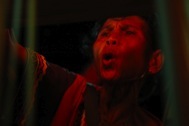
The World of Agusan Manobo Music




Messages in tud-om normatively convey the sensation of “being passed by,” i.e., with references to the opportunity of meeting a visitor and to the idea of being “alighted” by a spirit. The messages thus fitted perfectly with the cultural convention of facing another person. This act of song is therefore similar to the sharing of betel chew ingredients in self-related-other meetings.
Tud-om is improvised “speaking-in-song.” Although not unique to the Agusan Manobo, tud-om is identified with them for its associations with the voice of the spirit heard in ritual. In general, the songs’ messages center on the expression of politely “refusing” the guest to whom the song is addressed. Thus, the act of performing and sharing the voice is magnified. Tud-om vocal expression is intense and highly emotional; it is sung to a constricted, guttaral vocal style.
In most tud-om performance situations, song erupts when messages that are difficult to convey are presented obliquely to a listener via a melody. Hence, emotions are vented out just the same, but channeled positively so to speak.
Compared to everyday speech, tud-om utilizes a technique in which word constructions are altered and poetic words or “archaic words” are substituted to produce harmonious and pleasing locutions. Tud-om is thus an example of an art form that literally prevents violence; overtly confrontational disclosures of sentiment in speech—hard words—in public are imaginatively deflected, thanks to the song channel.
In ordinary performances, singers use their personal voices to address their related others. In extraordinary ritual performances, however, singers, who are mediums, use a different set of voices, this time of their spirithelpers. Manobos believe that voice in tud-om has its origin in nature, gradually discovered only by a singular self and therefore not alienable. It cannot be taught, but found only within one’s inner self. Yet it resonates with the self’s double, an abstract entity that enigmatically exists in external reality or in nature. It is for this reason that a tud-om sung with personal voice can always involuntarily shift to that of a spirit, particularly if the body who is doing the singing is a spirit medium (i.e., because the inner self and the double are mirrors of each other). Thus, tud-om expression lies at the border of the secular and sacred. It exists in a sphere where the bipolar distinction does not exist. This genre is radically different from the buwa-buwa or komposo.
Traditional Ritual Song (Tud-om)
